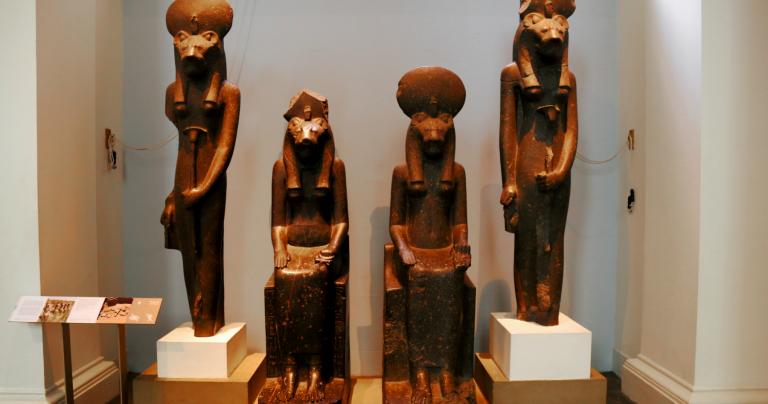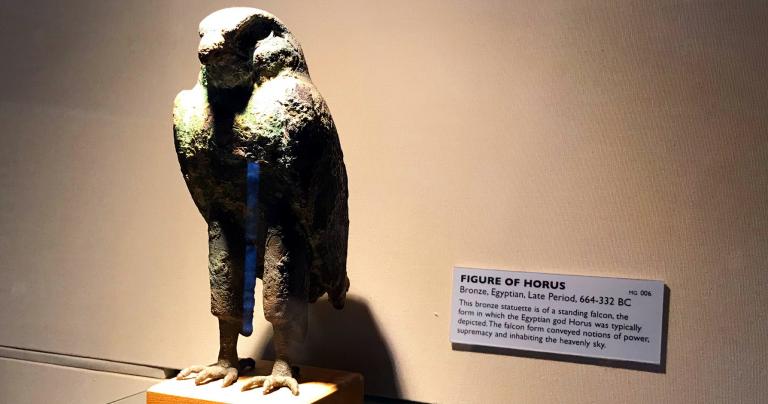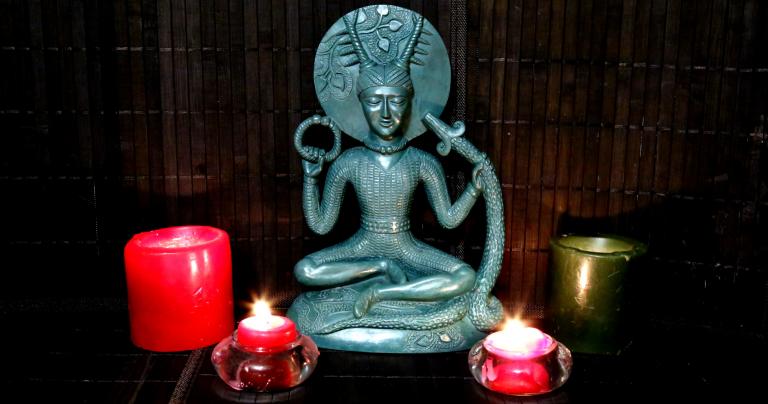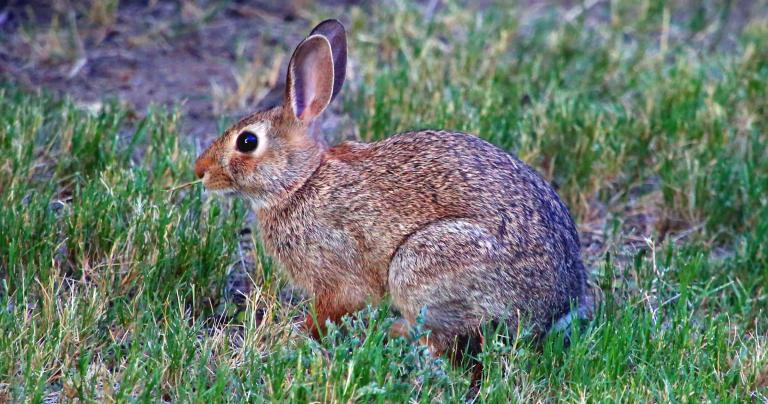The ancient Greek philosopher Xenophanes said:
But if cattle and horses and lions had hands or could paint with their hands and create works such as men do, horses like horses and cattle like cattle also would depict the Gods’ shapes and make their bodies of such a sort as the form they themselves have.
We still tend to assume the Gods look like us. And we often assume They think like us. In our time, Christian writer Anne Lamott said:
You can safely assume you’ve created God in your own image when it turns out that God hates all the same people you do.
Yet as polytheists, we recognize that this isn’t always true. Some of our Gods are not in our image.
It’s most evident in Egypt, where many of the deities have the heads of non-human animals. Horus is depicted as a falcon, or as a man with the head of a falcon. Thoth has the head of an ibis, Anubis the head of a jackal, and Sekhmet the head of a lioness.

The Babylonian Goddess Tiamat is usually depicted as a sea serpent.
Some of the European traditions have horned or antlered Gods, such as Pan or Cernunnos. And while the Morrigan is most often depicted as a human woman, She shapeshifts into a cow, an eel, a wolf, and a crow.
The typical academic explanation for these representations is that the artists wanted to illustrate how a particular deity has the characteristics of a particular animal: Sekhmet is fierce and Anubis cleans up the dead. There is almost certainly an aspect of reciprocity (and of sympathetic magic) in the depiction of Gods as animals who are hunted – if we honor the Stag God, He will bring the stags to our hunt. There is some truth to these explanations.
One thing is certain: the true forms of the Gods are beyond our knowledge, and likely beyond our ability to know. Which is the main point Xenophanes was trying to make, unlike those who’ve appropriated him as some sort of proto-monotheist.
Yet as polytheists who worship the not-entirely-human Gods as real, distinct, individual beings, there is another possible explanation: these are the forms in which They have chosen to reveal Themselves. If that’s the case – and I believe it is – what does that say to us?
Our Gods are their Gods too
One of Cernunnos’ epithets is Lord of the Animals. This is a modern epithet – we know virtually nothing about how He was understood and worshipped in ancient times. Still, given the cave painting The Sorcerer in the Cave of the Trois-Frères in France (from around 13,000 BCE), the artwork of the Gundestrup Cauldron (from around 100 BCE), and the numerous reports of contemporary UPG (including my own), that title seems both reasonable and appropriate.
The Lord of the Animals does not merely deliver animals to humans to be used as food. He both rules over the generative forces of Nature and personifies them (remember that there are both human persons and other-than-human persons). He is the God of all persons, not just humans.
I do not believe other animals worship the Gods as we do, as is sometimes depicted in “First Christmas” stories of animals worshipping the baby Jesus. That’s too much anthropomorphization for my tastes. Though, I wouldn’t be surprised to discover that some species do, such as dolphins, elephants, and corvids. But if a God has responsibility for a particular aspect of Nature, it stands to reason that They will have a relationship with the persons that comprise that aspect – and those persons will have a relationship with Them.
We do not have exclusive relationships with our Gods. The Gods of humans are the Gods of other species as well.
It’s not all about us!
If our Gods are their Gods too, we have no reason to expect Them to preference us above the rabbits and squirrels, or above the wolves and bears.
Christianity argues for Imago Dei – that humans alone are made in the image of their God. Yet other than the combination of language and opposable thumbs, what do we have that other species do not? We share 96% of our DNA with chimps and bonobos, who are more closely related to us than they are to gorillas. We are the most powerful species on this planet – whether we are the wisest is another question altogether. Our power – that we often abuse – entitles us to no special favors from the Gods.
That the Gods devote attention to us reminds us that we are important to Them, and that we can form relationships with Them that are mutually respectful and mutually beneficial. But let us never be so arrogant as to believe we are their sole or even their primary concern.
But beware your unexamined guilt
I regularly come across comments from Pagans that say things like “humans are an infection on the Earth that must be wiped out!” Now, I understand and appreciate the damage our species has done to the Earth. There have been five mass extinctions in the history of our planet. We’re in the middle of the sixth and unlike the first five this one is almost entirely due to human activity. There are significant changes we need to make, some at the individual level and many more at the societal level.
But each and every one of the seven and a half billion people alive today are persons of inherent value and worth who, whatever their sins, do not deserve death and extinction. When I hear people wishing our species would die off, what I really hear is “it’s easier to wish death on billions of people than to work through my Catholic and/or Calvinist guilt, which I’m not really aware of, because self-reflection is hard and scary.”
You don’t get off that easy. We don’t get off that easy. We’ve made a mess of things, and we’re going to have to clean it up. The sooner we get started, the sooner it will be done.
Not the head and not the center, but a part
We are not the center of the universe. We are not its head. We are not even the favorite children of the Gods.
Rather, we are one part of the living world. We are the biological relatives of every species on this planet, and we are the spiritual relatives of every person in every realm. Our part is important and valued and sacred. And so is every other part.
Praise be to the Animal Gods and to the Gods of the Animals!

Thanks to Rynn Fox for inspiring this post in private conversation.
Thanks to Dr. Edward Butler for the Xenophanes references that clearly show he was a critically thinking polytheist, not a proto-monotheist.


















